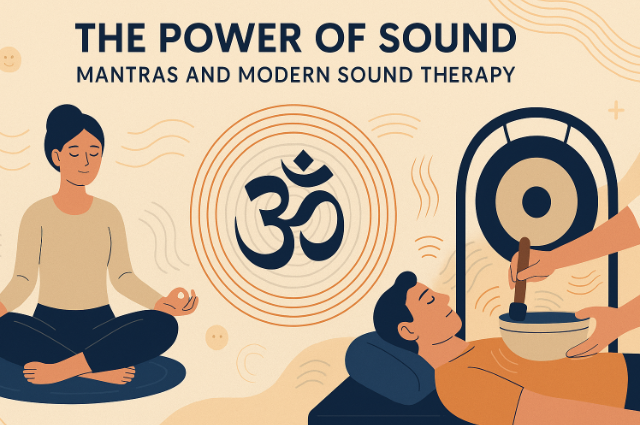
Sound
Sound is a vibration that passes an acoustic wave pattern through transmission, such as a gas, liquid or solid.
In human psychology, sound is the reception of such waves and their perception by the brain.
Mantras
The word mantra is also used in English to refer to something that is said frequently and is deliberately repeated over and over.
Mantras are spiritually based, a group of words originating from Sanskrit. This gives a positive vibration while recitation.
Om is believed to be a powerful and important mantra in Hinduism. Even we can hear the Om mantra’s vibration in space too, which is why it is believed as powerful. It’s an example of bijamantra. It is believed to be the first sound in Hinduism and as iconic essence of absolute divine reality. We can feel the vibration from our lower body to the upper body transition. Longer mantras will originate from this and followed by various deities, truth, reality, love, knowledge and action. Examples of longer mantras are Om Nama Shivaya, Gayathri mantra, Hare Krishna mantra, Mani mantra, the mantra of light, and Namokar mantra. Mantras without any actual linguistic meaning are still considered to be musically uplifting and spiritually meaningful.
The use, structure, function, importance and types of mantras vary according to the school and philosophy of Jainism, Buddhism, Hinduism, Zoroastrianism, and Sikhism. A common practice is japa, the meditative repetition of a mantra, usually with the aid of mala (prayer beads). Mantras serve a central role in the Indian tantric traditions, which elaborate on yogic methods that make use of mantras. There is no generally accepted definition of mantra. In the meaning of mantras, one school says that it’s meaningless sound constructs and while the other study says that to are the most meaningful linguistic instruments of the mind. But both agree that mantras have melody and a well-designed mathematical precision in their construction, and that their influence on the reciter and listener is similar to that observed in people around the world listening to their beloved music is devoid of words.
In the Oxford dictionary, mantra is defined as a word or sound repeated to aid concentration in meditation. Cambridge Dictionary focuses on two different definitions. This refers first to Hinduism and second to Buddhism.
A word or sound that is believed to have a special spiritual power. The second definition is more general: a word or phrase that is often repeated and expresses a particularly strong belief.
Hinduism
Mantras are recited to worship God. It’s believed as a language to communicate with the divine. In other words, in Vedic times, mantras were recited as a practical, quotidian goal as intention, such as requesting a deity’s help in the discovery of lost cattle, the cure of illness, succeeding in the competitive sport or a journey away from home. The literal translation of Vedic mantras suggests that the function of mantra, in these cases, was to cope with the uncertainties and dilemmas of daily life. In a later period of Hinduism, mantras are recited with a transcendental redemptive goal as intention, such as escape from bad karma, and experiencing a spiritual connection with God.
Om Nama Shivayah
This mantra, Om Nama Shivayah, is considered to be the most powerful and has a great meaning as well. Om nama Shivayah has the meaning that combines the five elements of the earth
Om Nama Shivayah - O salutations to the auspicious one, I bow down to lord shiva, five-syllable mantra, na represents earth, ma means water, si means fire, va air and ya space.
Chanting this mantra is believed to purify our body and soul. Also enhances meditation, removes obstacles and eliminates negative emotions and energy such as fear. It can be chanted at any time, but 108 times is ideal.
Gayatri mantra
The Gayatri mantra is considered one of the most universal of all Hindu mantras, invoking the universal Brahman as the principle of knowledge and the illumination of the primordial sun. The mantra is extracted from the 10th verse of hymn 62 in book III of the Rig Veda.
Islam
In Islam, they also believe in Quranic verses for chanting while in prayer. They have different mantras according to their prayer timings. The most powerful Duas for protection are verses recited daily in early morning, afternoon and evening. These verses are Ayatul Kursi and three quls, such as Surah Naas, Surah Falaq, and Surah Ikhlaas.
They observe fasting for one month of Ramadan and recite their mantras and break the fast by evening after prayer. Every Friday is believed as Jummah Mubarak. Muslims offer weekly prayer at noon on Friday, as a core part of Islamic beliefs.
Christianism
Christian people also believe that the mantra has a spiritual influence. A popular mantra in the Jesus prayer, “Lord Jesus Christ, Son of God, have mercy on me, a sinner.” And there will be other common psalms that will be followed during occasions and prayers.
Sound therapy
Modern sound therapy is a practice that incorporates traditional practices with contemporary scientific understanding, using sound and vibration to heal the body and mind. It uses various tools and techniques such as singing bowls, gongs, and chimes to produce soothing sounds that can help reduce stress, anxiety, improve sleep, and enhance overall wellness. It’s a non-invasive therapy that can be used in conjunction with other forms of healing, such as meditation and yoga.
Works to release tension in your muscles, the vibrations from our instruments delve deeply into our body, much like ripples deep through water. Because our bodies are largely composed of liquid, these vibrations can move through our tissues and organs. They gently dissolve energy blockages and foster an overwhelming sense of calmness and relaxation.
References
- cambridgesleepsciences.com
- stolentime.com
